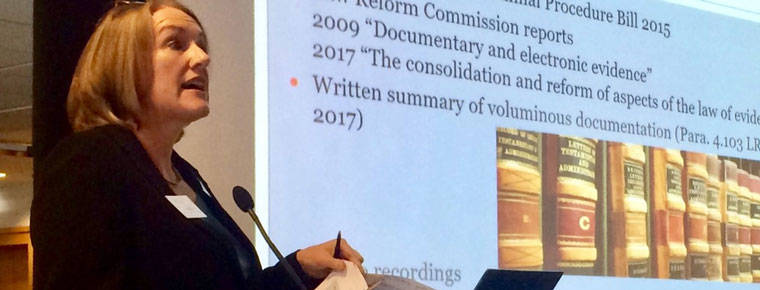
Digital evidence the new normal says DPP
Director of Public Prosecutions Claire Loftus told the Association for Criminal Justice Research and Development (ACJRD) annual conference that criminal cases with no digital evidence are now the exception rather than the norm.
“Digital material is all-pervasive in our daily lives, we are swamped in data,” the DPP said at the conference on 5 October 2018.
One effect of this overwhelming volume of data is that it translates into digital evidence and lengthy legal arguments regarding its admissibility.
“We now have longer trials because of access to digital evidence, which can be very compelling but voluminous,” the DPP told the ACJRD conference on 5 October at the Kilmainham Hilton in Dublin 8.
But this volume of material presents challenges. In one recent complex case investigators gathered about 850,000 exhibits.
Strategies
The Office of the DPP has developed strategies to go through this vast quantity of material, such as the use of specialist software and agreeing search terms with the defence team to capture relevant material for disclosure , because not all material gathered by investigators will be relevant to a particular case.
The DPP’s office is also piloting an electronic disclosure project so that defence solicitors can access relevant but unused case material securely.
Gigantic books of evidence
Potentially gigantic books of evidence have also been slimmed within the terms of the Criminal Procedure Act 1967 by serving copies of all exhibits on USBs.
We need to find ways to shorten trials instead of tying up a jury for weeks, as lawyers debate matters that could have been sorted out in a pre-trial hearing, the DPP suggested. She noted the Criminal Procedure Bill 2015 provides for pre-trial hearings.
Digital evidence is now ubiquitous, the DPP said, and the courts have held it can be real evidence as in the case of phone records and CCTV footage. Real evidence includes digital evidence “created without human intervention”.
Digital data
Digital or electronic evidence is defined as gathered from any piece of technology that processes or stores digital data, such as the content on laptops, servers, CDs, USBs or digital cameras.
In court, compelling Facebook records have been found to be real evidence and the Court of Appeal has upheld its admissibility on appeal.
Facebook admissions
Such Facebook messages can sometimes constitute confessions to a crime, the DPP said.
The DPP office has dealt with a more than 500 per cent increase in the volume of mutual legal assistance requests for evidence abroad since 2010 and many of these are to online service providers.